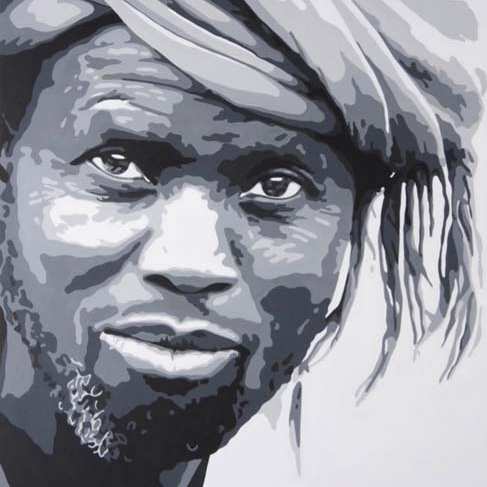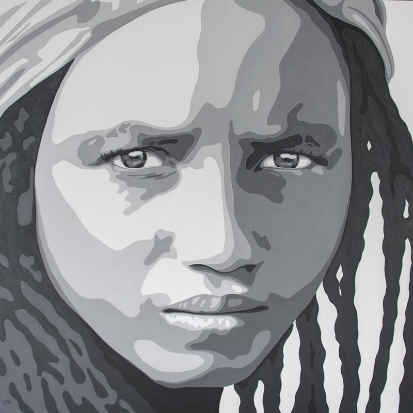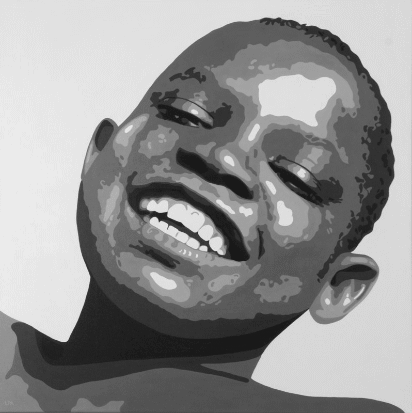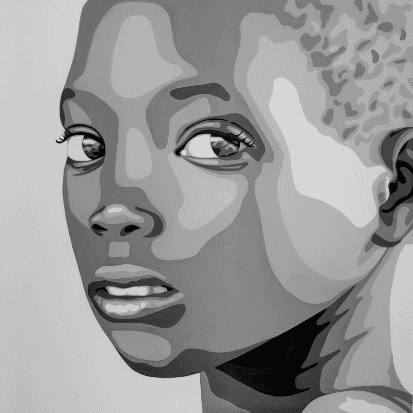ARTS
& OPINION: You’ve graduated from nursing in PEI (2001),
you’re doing well financially working in the field in
California (2001-2004), you find your work very satisfying,
and you decide to give it all up. Why?
LAURA
ARCHER: I wanted to see the world. I was in San Francisco one
day, waiting at a very expensive cafe for my very expensive
coffee, when I looked around and had a sudden realization –
I am insulated, protected from the world. I am lucky. So I quit
my job, packed my bags took off to see the world for 18 months.
A &
O: Your first stop is Viet Nam. You’re young, blond, attractive
with a runway figure – and travelling alone. How did you
deal with determined men eager to make your acquaintance?
LAURA
ARCHER: In my 18 months of travel, which included extended stays
in Turkey, India, Syria, Egypt and Jordon, I wasn’t sexually
compromised once. I think a lot depends on the vibe you project.
I always make a point of learning the language basics of my
host country, I respect the dress codes; I take a ‘real’
interest in the culture. I understand and respect the constraints
that come with traveling solo and make choices accordingly.
Perhaps it has just been a matter of luck that I have never
had any difficulties while traveling, but I also suspect that
never showing fear (which I believe people can sense) has helped
a great deal.
A
& O: So you travelled around the world and ended up in Thailand
as the 2004 tsunami hit?
LAURA
ARCHER: Yes. Since I was a nurse I wanted to help, but they
couldn’t use me; at that point they were overwhelmed with
volunteers. When I realized that I couldn't be of any assistance
in Thailand, I did a couple of days research, jumped on a plane
to India, and ended up on the beach on the south-east coast,
where I set up a clinic in Tamil Nadu, south of Chennai.
A &
O: Did you require permission from the authorities? Did you
have to prove you were a certified nurse?
LAURA
ARCHER: No. I was there to help and there were many that needed
help. My motives and legitimacy were never questioned. After
three weeks helping the people there, the needs had diminished
enough for me to pack up the clinic. The experience made me
realize that I actually loved nursing, and I loved doing it
in unconventional settings. During my time in the clinic, I
began to contemplate my future, and wondered whether I would
be content going back to a standard hospital in the west.
A &
O: And where does your art fit into this?
LAURA
ARCHER: It didn't and wouldn’t for a long time. But while
in India I found myself developing a major interest in photography,
which sort of took me by surprise. Especially when I found myself
deciding not to join friends for late night fun because I wanted
to be up at 6 am for the incredible sunrise shots, of the ghats,
for example, in Varanasi, or the camels feeding in Jaisalmer
(Rajasthan). What was important at this stage is that I began
to look at the world through a lens.
A &
O: Eighteen months of travel comes to an end (2006), you’re
back in Canada, installed in Montreal, in part to learn French,
and you decide to join MSF (Médecins Sans Frontières).
LAURA
ARCHER: It’s a bit more complicated than that. You don’t
just join MSF. I filled out an application form and after a
four hour interview I waited for nearly six months before I
received my first assignment. Before they hire you, they want
to be sure you’re not a romantic or idealist looking for
adventure; they want to be sure that you’re mentally and
physically fit and can adjust to difficult living conditions
and that you have had enough life experience to help you make
the right decisions.
 A
& O: And then you’re sent to Chad for your first assignment.
That must have pleased your family?
A
& O: And then you’re sent to Chad for your first assignment.
That must have pleased your family?
LAURA
ARCHER: They were OK with it and have always respected my choices
in life. Mom and Dad have always been very supportive, have
backed my decisions and have always trusted my judgment.
A &
O: And what was your mandate?
LAURA
ARCHER: I was stationed in the South Central Chad, not more
than 30 kms from the border of the Central African Republic
(CAR). Because of the political turmoil near the border of CAR
-- even though I was in Chad -- I was dealing with mostly refugees
from the CAR. There were two large refugee camps there and I
was put in charge of the Out Reach program which employed 30
local staff.
Our
activities included health education, hygiene and health promotion.
We gave medical assistance through an outpatient department
and a small inpatients department. We initiated a malnutrition
program and provided vaccination for newly arriving refugees.
A &
O: Give me sense of what it’s like living in a compound
in the middle of nowhere?
LAURA
ARCHER: First of all, nowhere is everywhere for a displaced
population. It becomes their home and it’s truly impressive
to see how they adapt to what is mostly a thankless life. For
security reasons we weren’t able to live in the camps.
We lived in a small compound in grass mud huts adjacent to the
camps. There was no running water, we shared an outdoor latrine
– and that was it. Most waking hours we spent in the health
facilities or walking in the camps.
A &
O: At times, you must have missed the comforts of home?
LAURA
ARCHER: Not really. This is where I wanted to be and I was doing
what I wanted to do.
A &
O: Did you witness death?
LAURA
ARCHER: Almost everyday. Learning to live with it was the one
of the most difficult aspect of my first posting. In California,
even though I worked in emergency, I experienced only one death
of a child, and it was extremely difficult for the parents of
the child, for me and indeed, for the entire staff of the ER.
There’s nothing more difficult than having to tell a mother
that her child has died. But in Chad it became a daily experience
and you find yourself dealing with it in a way that would shock
you if you were told that’s how you’ll one day respond
to death
Everything
in the field is more extreme, intense. You see babies that survive
through nothing more than love and strength of human spirit,
and people who die when they shouldn't. Maybe because life is
not taken for granted, death is viewed completely differently,
with a resignation and maybe an acceptance.
A &
O: Did you know why you were attracted to humanitarian work
before you arrived in Chad or did you discover the reasons through
the experience?
LAURA
ARCHER: I got a glimpse of it in India but Chad definitely crystallized
why I feel the need to be in those situations that conventional
nursing simply doesn’t offer.
A &
O: There is suffering and death in your own country, why not
help your own kind?
LAURA
ARCHER: Humankind is my kind. However, that’s a fair question.
Helping people is what it’s about. I work in countries
where you might have to wait for days for the mobile clinic
to be seen. I work in countries where women die in childbirth
from the most basic of complications, where children still die
from TB, measles, tetanus and rabies. I work in countries where
people might have to ride a donkey for two days just to receive
the most basic of health care, then spend a week’s worth
of food money for drugs for their children. Right now, I’m
physically, mentally and spiritually capable of working in developing
countries. I'm good at my work, and I enjoy it and I feel like
I’m helping people in the best way that I can.
When
you arrive at a refugee camp, there isn’t much there other
than the basic necessities of life – if you’re lucky.
You meet and deal with people who have suffered terribly, who
have lived through unimaginable loss, have nothing but the clothes
on their backs, and have experienced the worst of what men can
do to other men. And yet every morning, they wake, care for
their families and communities; maintain their culture and individuality,
and every night come home and dance like their ancestors have
done for millenniums before.
I’m
also very much attracted to the realness. In fact it’s
probably one of the reasons I keep going back. When you’re
living in a simple hut sharing a common toilet there is no room
for pretension or airs. Life reduces, and I mean that in a positive
sense; everyone there is true to themselves. Everyone in the
field lives authentically; there is no BS. You arrive and you
immediately grasp that you’re not there to impress. People
are suffering and dying and they don’t care if you’re
wearing lipstick or not. There’s an urgency that brings
everyone together into a tightly knit community that you can’t
get anywhere else. And you quickly realize that it corresponds
to something very primordial in all of us, especially the respect
people show for each other -- and the spontaneous bursts of
life where you least expect it.
A &
O: Is it addicting? A palliative
care worker once confessed that she is addicted
to being needed, that most of her colleagues have suffered loss
and abandonment, that they are attracted to the work as much
for themselves as the people they are helping.
LAURA
ARCHER: For sure it’s very satisfying knowing that you
are helping people in need. And the sense of community that
develops is something you will never forget. It doesn't matter
WHY we go. What matters, in this day and age, is the fact humanitarian
crises still exist. It’s the work that counts; it’s
understanding that there is so much suffering in the world that
falls beneath the radar, and that so much of it is unnecessary,
That's why we go. It’s a protest against the way things
are; an inability to accept the status quo.
A &
O: You have dealt with rape victims. Have you been able to help
them?
 LAURA
ARCHER: Not in the way I would like. We managed to set up a
Sex and Gender-based Violence Program that encouraged rape victims
to come forward and talk about their violation and receive medical
assistance, knowing that what they said would be guarded in
strict confidence. It might seem like a very small step but
it’s a first step that allows women to talk about their
pain and anger and see themselves as part of a larger group
with a larger agenda. Change comes slowly but it eventually
comes.
LAURA
ARCHER: Not in the way I would like. We managed to set up a
Sex and Gender-based Violence Program that encouraged rape victims
to come forward and talk about their violation and receive medical
assistance, knowing that what they said would be guarded in
strict confidence. It might seem like a very small step but
it’s a first step that allows women to talk about their
pain and anger and see themselves as part of a larger group
with a larger agenda. Change comes slowly but it eventually
comes.
A &
O: Having seen the best but also the worst of mankind, I’m
surprised you don’t hate men.
LAURA
ARCHER: I remain an optimist because the folks that I work for
and with, who have suffered so much, have shown me that it’s
possible to be moral and caring in the most brutal circumstance.
Through my humanitarian work, I have witnessed what is real
strength and courage – and it has nothing to do with the
gun. Sure, I hate men who rape women at gunpoint, who drive
innocent people from their homes, murder babies and burn crops.
But is that all men? Absolutely not. There are thousands of
men who spend their days helping people, giving their lives
to help the less fortunate. So, rather than talk about men,
I would prefer to talk about the problems of the world and what
we need to collectively do in order to affect change. Millions
of people have access to health care while billions of innocents
in the world suffer from diseases that can be cured.
So
yes, I have witnessed first hand man at his ugly worst, but
I have known child soldiers who have learned to love and have
met horribly violated women who haven’t forgotten but
who have forged ahead with their lives.
A &
O: We hear or read about it from time to time. Can you talk
about the promiscuity in the field?
LAURA
ARCHER: Sure, I could, but is that the reason that we're talking?
Or do you want talk about my art?
A &
O: So you’re back in Montreal (2007), digesting what has
been a remarkable six months in Chad, and you find yourself
looking at your photographs and wanting to paint and possibly
exhibit. First of all, why not just exhibit your photographs?
LAURA
ARCHER: To start, I'm not a professional photographer, and my
photos are not at a level that warrants an exhibition. My art
is therapeutic to me. I'd never painted anything more than a
wall before I came home from Chad. But when I got home I needed
to do more than simply talk about my feelings. I needed to bring
these people back with me, and to show people in my world how
the people in the other world looked, indeed how they saw. I
hope that happens with my paintings. You don't have to love
them, or even like them. It’s my témoignage
– people in this world see what I see. When viewing one
of my paintings, you look into the same eyes that I looked into.
It takes 150 hours for me to do a portrait. I'm happy when I
paint, possibly happier doing that than anything else. It’s
a physical joy. There's no bullshit to it – it’s
me, my brushes and paints, and the person that I am painting
only.
 A
& O: Are you surprised by the artist that is coming out
of the closet?
A
& O: Are you surprised by the artist that is coming out
of the closet?
LAURA
ARCHER: For sure, even though my mother is an artist. But at
that time I still regarded it as a hobby and was very insecure
about it until I began to receive positive comments from friends.
Then I got called suddenly to Congo for a measles vaccination
campaign. I'd completed two portraits when I left for Congo,
but when I arrived home I sat down and painted. After a year
I had painted another 25 portraits, and organized a small exhibition
which attracted the attention of the local media. 
A &
O: Were you beginning to question your calling as a humanitarian
nurse at this point?
LAURA
ARCHER: I was certainly asking myself how I can best help the
causes I believe in and I was wondering if art might be more
effective vehicle than working in the field. But I was not sure
yet and I was still lacking in confidence as an artist.
A &
O: In 2008, you are sent to North Darfur as a nutritional coordinator,
with the mandate of dealing with malnutrition. And then you
are kidnapped, in fact you are the first Westerner kidnapped
in Darfur, an event which became international news. Tell me
what you can about it and how you were personally affected?
LAURA
ARCHER: Three of us were in the kitchen when seven heavily armed
men broke in and told us (along with two guards) to get into
a truck. At first I didn’t realize it was a kidnapping.
I thought they wanted to be taken to the clinic so they could
steal the drugs, but that wasn’t the case.
A &
O: How were you treated?
LAURA
ARCHER: We were properly fed and weren’t harmed. In fact
we weren’t even confined. We were in the middle of the
desert, which is nowhere, and they knew there was nowhere to
go.
A &
O: Did you get to know your abductors? Did they try to win you,
convert you to their cause?
LAURA
ARCHER: No.
A &
O: Did you fear for your life? Describe your state of mind while
being held.
LAURA
ARCHER: Oddly enough I wasn’t afraid. I almost immediately
resigned myself to what was happening but was totally alert
to what might happen. As it turned out, we were released after
three days in captivity.
A &
O: After the kidnapping is resolved, you’re back in Canada,
and for the first time in your life you get a taste of celebrity.
You must have enjoyed being a star?
LAURA
ARCHER: Wrong. In fact, I went into semi-reclusive mode when
I got back. I didn’t want anything to do with a media
that was interested in me and not the causes that I believed
in. They wanted a story, or the vicarious thrill of being in
the company of someone ‘famous.’ They were knocking
on the wrong door. The net effect of this was I almost immediately
got back into painting, and began to seriously think of myself
as an artist.
A &
O: Is there a before and after the kidnapping Laura Archer?
Did your painting change consequent to the kidnapping?
LAURA
ARCHER: The event obviously impacted me personally, on levels
that I'm not even sure about now. How it has affected my art
would be something that other people would have to judge. I
started painting after Chad, not after Darfur and the kidnapping.
The therapy that I talk about is not to get me over the kidnapping
– it’s to share my experience of working and helping
people in the poorest countries in the world with people here
in Canada.
The
painting process had to evolve, obviously, because the kidnappers
weren't all that keen to have their photos taken, so I had to
do some of the new paintings from memory. This represents a
new challenge, especially accuracy and getting the first sketch
down on paper.
A &
O: Does art have to be socially relevant?
LAURA
ARCHER: In my case, yes.
A &
O: So have you made the decision to dedicate your life to art?
LAURA
ARCHER: In fact I'm writing to you right now from Niger where
I am working as medical coordinator with MSF. But the first
major
exhibition of my work is currently taking place
in Charlottetown, PEI. My life will always be dedicated to my
art, but paintings are not the only art in my life. Seeing the
changes that I can help affect in the world, both here in Canada
and in the field, is inspiring. If art is defined as the only
honest language there is, then I live my life as honestly as
I can. At home when I paint, in the field when I bandage a wound,
coordinate a medical program or just talk to someone who has
seen unimaginable things, I believe that I am helping to the
best of my ability and am striving to affect a change. I am
an artist, and I always will be; wherever I am and whatever
I do.
A &
O: How important is music in your life?
LAURA
ARCHER: In the field, it’s my escape. I don’t do
drugs, alcohol only occasionally.
A &
O: What music does the trick?
LAURA
ARCHER: Massive Attack, Led Zeppelin, Tom Waits, Radiohead,
Fever Ray, Xavier Rudd . . . It depends on my mood.
A &
O: Do you have a favourite writer?
LAURA
ARCHER: I like Will Self, David Sedaris, Chuck Klosterman, Augusten
Burroughs, Charles Bukowski . . . The list goes on. One of my
favourite books is The Tao of Pooh by Benjamin Hoff.
A &
O: If you could clone one person, who would it be?
LAURA
ARCHER: I'm not sure that I would. Cloning someone is not the
answer. We need to rethink our priorities, our distribution
of wealth. We need to redefine the paradigm,
the way we see the world, and the way that we, personally, relate
to the world and all of the people in it today.
A &
O: Thank you, Laura Archer, and may your kind increase.
All
images © Laura Archer